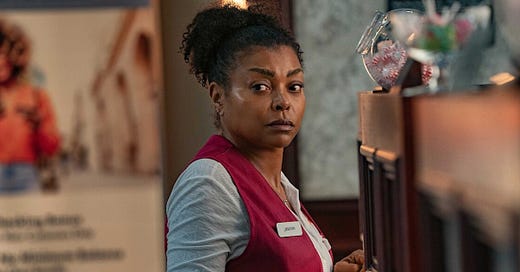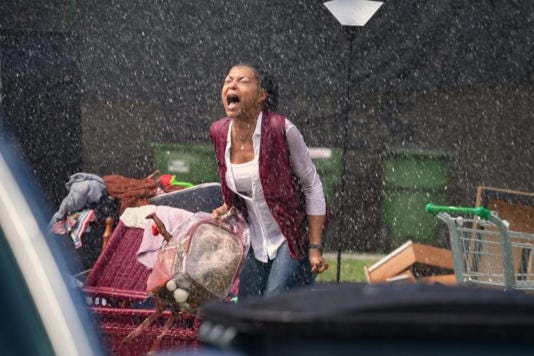Straw (2025)
Streaming on Netflix
After a hectic but gripping movie experience, you want to give credit where it’s due. But when the director seems to be aiming his camera hither and yon, it’s not always easy to know what he’s up to. Is he obscuring the very essence of what he wants us to understand?
I think writer-director Tyler Perry strikes a solid nerve in Straw, but his movie requires careful attention in order to feel it.
Janiyah (Taraji P. Henson), a single Black mother in Atlanta, is stretched to the breaking point, and she seems about to snap. Her most critical problem is her chronically ill eight-year-old daughter Aria (Gabby Jackson), whose medication is expensive.
Also, Aria’s school requires $40 to enroll her in a lunch program. With the rent overdue, Janiyah’s hateful landlady has filed eviction papers, and warns Janiyah that her belongings will be out on the street if the rent isn’t paid by the middle of this very morning.
Janiyah pledges it will be, but we see on her face she’s making promises she’s not sure she can keep.
Perry, for all the whizzing action, is stressing the inner not the outer drama. That’s where he takes his stand, sends up his cries.
This movie’s rapidly-paced action — it was shot in an astonishing four days — with its whirling camera work, including cars spinning on wet pavement in dazzling drone shots, can throw you off track. What’s actually at stake here is a woman’s will to live. But if you let the speed fool you, you could miss it.
Arriving at her job as a grocery checkout clerk, Janiyah asks her boss if she can leave briefly to withdraw from her bank that $40 for Aria’s school lunches. He grudgingly agrees to give her 30 minutes. She heads to the bank across the street where the staff knows her. But she doesn’t have enough money in her account.
She hurries to Aria’s school to ask for more time to pay the lunch fee, and on the way back to work, she’s threatened by a mean white cop who claims she rammed and damaged his new car and vows to kill her if he gets the chance.
She also stops by her apartment building to find her landlady has dumped all her belongings on the street, in pouring rain.
Janiyah (Tariji P. Henson), screaming in rage, with her belongings in the pouring rain
Her troubles are only beginning. It’s taken her two hours to return to work, so Richard (Glynn Turman), her glowering boss, angrily fires her. In his office as she demands her paycheck they’re interrupted by robbers. In the ensuing mayhem, Janiyah accidentally fatally shoots both her boss and one of the robbers.
Not taking any of the money the robbers have left lying on Richard’s desk, she grabs her bloodied paycheck and, delirious with fear and rage, heads back to the bank to cash her check. We can’t miss that she’s slipping over the edge.
She’s still, albeit half-consciously, carrying the gun. And since she’s lost her ID and her paycheck can’t be cashed, an “innocent” attempt to get her money turns into what looks like armed robbery.
Now furiously waving the gun, Janiyah demands the doors be locked, while she holds bank manager Nicole (Sherri Shepherd), two tellers and three customers hostage.
Police encircle the bank, and a standoff is underway. But this is no Dog Day Afternoon (1975). Sidney Lumet shot that heist-hostage melodrama in a sharp photorealist style, not unlike what happens here. Lives hung in the balance while Sonny (Al Pacino) waved a gun and demanded an immediate cash haul.
Lumet feels for Sonny. Perry, refining his shooting style with carefully timed hallucinatory touches, is more fervently empathetic toward Janiyah, whose splintering mind isn’t remotely as stealthy as the wily Sonny’s.
Crucially, the moral landscape surrounding her is more diffuse and muted than the social disorder of the ’70s.
Sonny roared “Attica!” to gathering crowds. Distrust of public authority back then was in the daily headlines. Only faint echoes of that sort of shared public outrage show up today, and blaming the victims has returned as the readiest social control mechanism.
By today’s standards, in other words, Janiyah is her own fault. Even some of the Blacks she takes hostage agree. No one sees her. She represents a recurrent but by now rarely reported social canker, boils that burst noiselessly, one lost life at a time.
Because Perry, for all the whizzing action, is stressing the inner not the outer drama. That’s where he takes his stand, sends up his cries.
Which is what makes Janiyah’s raw pain so hard to watch. Perry wisely widens the view on it when one of the tellers rigs her iPhone to broadcast live what’s happening in the bank, and the feed is televised.
Janiyah is losing every battle, and her absurd attempt at holding hostages looks like total disaster.
But finally, a spellbound public sees and hears her wail, watches a woman – struggling to support herself and her daughter – whose will to live is seeping away.
The chanting crowds she draws to the bank wave placards of support, just as Sonny’s supporters did, but can the centers of power today – yes, the cold, snarling FBI, unasked for, barrels in – understand this lone woman’s plea?
Perry pushes that question to the limit with a stunning reveal in the closing minutes that I didn’t see coming. I’ll just say that it asks whether we as a society can intervene before all is lost for the Janiyahs around us.
Henson’s raw performance ripped me apart. It will be very wrong if she’s overlooked in the coming awards season. Her work here is full bore, but she also gets across Janiyah’s desperation with the tiniest dimming of her eyes, the slightest lift or fall of her shoulders, the quiet despairing whispers her voice drops into.
Whether Janiyah is whimpering or howling in pain, Henson leaves no doubt that we’re witnessing a woman pushed past endurance.
She’s helped by a meticulously tender performance from Shepherd as the branch manager who sees into Janiyah’s pain and knows that healing will require more resources than this suffering woman can even envision, much less ask for.
The chilling fact of seeing so much, while being able to do so little, ripples across Shepherd’s face with a beautifully understated compassion.
I’ve seen snippets of reviews accusing Perry of oversimplifying: Black women good, white cops bad. Indeed, Teyana Taylor registers nicely as Detective Richmond, a Black cop who, talking to Janiyah by phone, gains her trust. Richmond is the child of a single mother and a single mother herself.
But there’s no “sisterhood” or group solidarity embedded in the script. Tessa (Ashley Versher), one of the Black tellers held hostage, isn’t swayed by Janiyah’s pleas, nor is an older Black couple who mid-ordeal simply walk out of the bank in disgust.
And there’s a “good” white cop, a skilled negotiator who lets Detective Richmond sustain her bond with Janiyah.
Perry’s not hunting for devils. It’s dismaying when those who bewail divisions seem, in calling them out, to be trying to perpetuate rather than dispel them.
Perry is pointing out – by consciously “overdramatizing” – those social moments when individual cries of distress go unheard. How many despairing Janiyahs are out there, and how close are they to collapse? In a decent society that question knows no color.






Absolutely a strong write-up Ivan. I WILL watch it sometime this week.
İnteresting review but doesn't make me want to see the film.